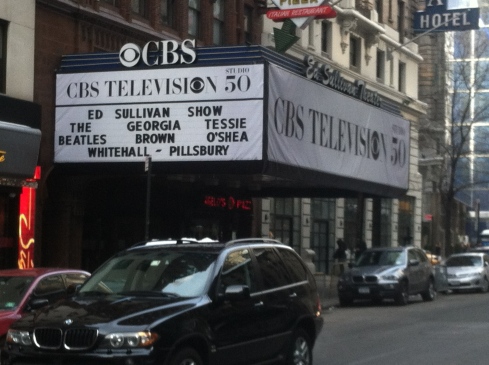You are currently browsing the tag archive for the ‘Ed Sullivan’ tag.
The city has been awash this week in exuberant nostalgia for the Ed Sullivan Show-era Beatles, and I have found myself oddly delighted to be carried along in its tide. This weekend, while walking through midtown I came across this:
and this:
While I was taking the latter picture, a TV reporter and cameraman doing man-on-the-street interviews about The Beatles’ anniversary approached me, and I chatted with them. It turned out they were from Al Jazeera America, though I have no idea if they used the footage. They asked me what I felt about the Beatlemania moment, and I actually came up with something halfway intelligent, so I thought I’d expand it here.
One of the great joys of The Beatles is the complete lack of irony or cynicism in both their lyrics and their music. Consider the early songs: as Paul McCartney reminded us from the stage of the big televised 50th Anniversary concert on Sunday night, the first song he and John Lennon ever wrote together was I Saw Her Standing There (“How could I dance with another…”). I Want to Hold Your Hand seems quaint now, but its emotion is utterly honest—it does not sound like two songwriting professionals, one of them married, writing down for a teenage audience, it sounds like a personal moment being written, and perhaps relived, with absolute conviction.
And so it would stay with every album: the omniscient narrator in She’s Leaving Home (off Sergeant Pepper) sees the girl’s need to leave home as honestly as he sees the mother’s heartfelt response to her absence; there’s no cynicism about the mother, just a revealing comment that helps explain the daughter’s decision. She may be self-centered, but she cares enough to feel the moment sharply. This opposed to the Stones’ Mother’s Little Helper, in which the mother’s response to the rather pedestrian realities of her life is to run to the doctor for more pills to numb her emotions, culminating in a prediction of her eventual overdose. A protest song, mildly, but irony and cynicism are undeniably part of the tools of its construction.
So: a universe of clear and unironic emotion came over on that Pan Am plane from England, 50 years ago. But part of the great fun of The Beatles of that era, before they retreated from public presentation and just concentrated on studio music, was how damn funny they were—and that humor is laced with irony and cynicism. (Moptop-era press conference. Reporter: “Do you think Ringo is the best drummer in the world?” John: “He’s not even the best drummer in The Beatles!”) There is a lot of cultural frisson to be gained from this simultaneous juxtaposition of opposites, as Bob Dylan would be the first to tell you, were he in the mood. But transparently honest songcraft coupled with good looks and brutal insouciant wit doesn’t explain the screaming girls that gave a full-throated sob of joy and longing and recognition as the lads got off the plane at Kennedy, arrived at the Ed Sullivan Theater, played their songs and left. The band were no strangers to Beatlemania, but their earlier singles had not charted as highly in the States as elsewhere. Given that, the cultural moment they walked into when they arrived in America was so big it took them by surprise. It turned out they were precisely the right people for the job—they needed America, and America, or at least an enormous slice of the American demographic—obviously needed them.
And, looking up at the facsimile scrim on the Ed Sullivan Theater last Sunday, on camera with Al Jazeera, I suddenly had a strong emotional recognition of something I’d previously only considered intellectually.
They played the Sullivan show on February 9, 1964. That’s less than three months after November 22, 1963. Kennedy gets assassinated in Dallas, and 80 days later America goes Beatle-mad.
Now, it’s not like pop stars hadn’t had screaming fans before—the bobby soxers at the Paramount didn’t exactly preserve decorum when Sinatra hit the stage. However, The Beatles’ Sullivan moment was big enough, and public enough, to be mystifying to the culture as a whole. (As related elsewhere in this blog, the night they were on Sullivan my maternal grandfather was utterly baffled by the phenomenon even as I wanted to be in the room with the television to see it.)
But there’s no mystery if you consider the screaming, crying, sobbing emotion unleashed by The Beatles in the light of an overdetermined reaction to the Kennedy assassination. America had just lost a young, charismatic President. The Beatles presented an opportunity for a convulsive national orgasm of sobbed joy, the life-affirming sex after the funeral. But beyond sex appeal they offered interpersonal humor in the service of songs of transcendent irony-free innocence. It’s hard not to be cynical about the world after a popular president is taken from us. But in The Beatles’ world, innocence was a given and cynicism an impossibility, and that was something to hold onto and scream.


